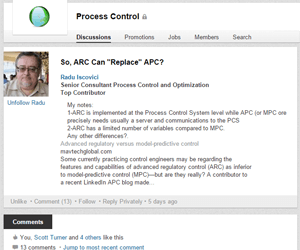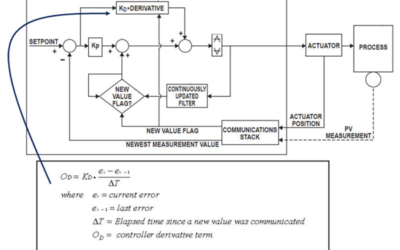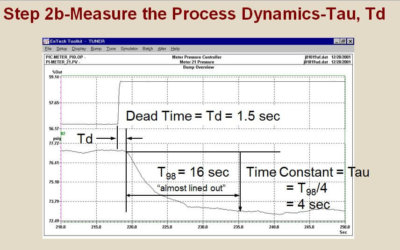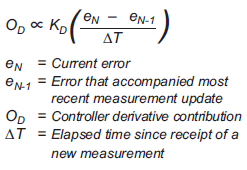I wanted to bring additional visibility to a great thread in the LinkedIn Process Control group on advanced regulatory control versus advanced process control. The post, So, ARC Can "Replace" APC? is based on a blog post, Advanced regulatory versus model-predictive...
PID control
PID Control in 3-Phase Oil and Gas Separation
The PID controller entry in Wikipedia highlights the beginning of proportional+integral+derivative control going all the way back to the 19th century: PID controllers date to 1890s governor design.[2][3] PID controllers were subsequently developed in automatic ship...
Methodology for Solving Control Loop Problems
This time of year, after our big Emerson Exchange conference, I like to go back and see what sessions I missed to be able to be able to recap for you. I caught up with Emerson's Mark Coughran, whom you may recall from many control performance-related posts. He...
Regulatory and Model Predictive Control Difference?
Over in LinkedIn's Process Control group, a question was asked: What is the difference between regulatory and model predictive control. Is it possible that MPC work as stand alone without regulatory control? Emerson's Chowyang Neo offered: Regulatory Control generally...
Setpoint Lead-Lag Question and Answer
I wanted to share this question and answer on setpoint lead-lag, from the Mentoring Engineers discussion group in the Emerson Exchange 365 community. The question: …one of the options you recommend for eliminating overshoot at setpoint changes is using a setpoint...
Wireless Measurements in Control Applications
As wireless technology continues to be used in process manufacturing facilities, those used in control applications are increasing. At the ISA Automation Week conference, Emerson's Terry Blevins, Mark Nixon, and Marty Zielinski authored the paper, Using Wireless...
Lambda Control-Loop Tuning Essentials with James Beall
Having trouble with an oscillating integrating process? Have too much variability in a self-regulated process? Need a refresher about the essentials of Lambda (λ) tuning? Then check out James Beall's workshop at the Jan. 21–23 Texas A&M University 2014...
Applying Lambda Tuning to Six Common Control Challenges
Last year, some controversy broke out in the process automation and control community about the use of Lambda tuning for proportional-integral-derivative (PID)-based control. In a post, Lambda Tuning-Yeah or Neah?, we offered a differing view to a Control magazine...
A Unified PID Control Methodology
PID control is the workhorse of process automation. At this week's AIChE 2013 Spring Meeting and 9th Global Congress on Process Safety, Control Talk blog's Greg McMillan and Eastman Chemical's Héctor Torres presented their paper, A Unified PID Control Methodology to...
PID Control History and Advancements
PID (proportional-integral-derivative) control, a foundational control technology for process manufacturers, has been with us since the early 1900s. In a Control Engineering article, Evolving PID Tuning Rules - A Brief History, Starting With The Earliest PID...
Enjoy New Orleans and Learn Process Automation this Week
I had the pleasure of beginning my process automation career in New Orleans, Louisiana working as a Conoco systems engineer on offshore oil & gas platforms in the Gulf of Mexico. New Orleans' food, festivities, sights and sounds are firmly embedded in my memories....
Process Control with Wireless Devices
Emerson's Chris Womack discusses process control with IEC 62591 wireless devices in today's guest post. Using wireless devices in process control still isn't that common, but it's going to be. With its quick and easy installation, wireless technology is often used for...
Keep Up to Date With the Latest News and Updates
Follow Us
We invite you to follow us on Facebook, LinkedIn, Twitter and YouTube to stay up to date on the latest news, events and innovations that will help you face and solve your toughest challenges.
Do you want to reuse or translate content?
Just post a link to the entry and send us a quick note so we can share your work. Thank you very much.
Our Global Community
Emerson Exchange 365
The opinions expressed here are the personal opinions of the authors. Content published here is not read or approved by Emerson before it is posted and does not necessarily represent the views and opinions of Emerson.








